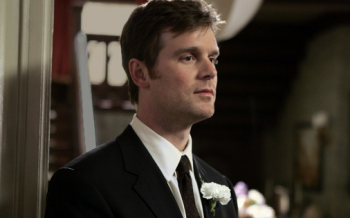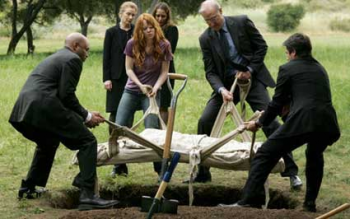Television and the Work of Mourning

Peter Krause as Nate Fisher Jr.
“You gotta go through all of the necessary stages of grief. That’s how you honor what a person actually meant to you.” — Nate Fisher, Jr. in “In Case of Rapture”, Episode 2, Season 4 of Six Feet Under.
I had not planned on writing this column. Of course, I had planned on writing a column, just not one about missing a television series, particularly one whose episodes I can easily access on DVD and online. But you can’t always plan where life is going to take you, even when you know that a significant portion of it is coming to an end. And throughout the past five years Six Feet Under held a significant place in my life. It was that one show that I tried to never miss, the one that truly compelled me. When in 2004 Alan Ball announced he would end his HBO series fans prepared with predictions and all of the other chatter typical of fan boards. Much to my chagrin I would have to accept the loss of what one friend of mine called this “own special brand of fucked up melodrama.”
So as the fifth and final season ended with the Fisher family in mourning, we were somewhat prepared. To loyal audiences, Nate Fisher Jr.’s death wasn’t terribly shocking. After all, Nate had had a near death experience that began at the end of season 2 and carried over into the beginning of season 3. And it was never clear whether or not his Arterio-Venous Malformation was sufficiently corrected. Because the Fishers specialized in dose after dose of denial, anger, bargaining and depression, the three episodes of televised grief that followed Nate’s passing weren’t even that shocking. If anything it was appropriate that in the final episode of the final season that we see the Fishers accept the loss of Nate through an impromptu commemoration of his life. The gesture provided as much closure as one might expect from a series that specialized in providing audiences with that occasional unresolved death, the kind that reminds us that narrative is the necessary frustration for those who remain.

Six Feet Under: Nate’s Burial
Yet, after the series ended, what surprised me was how much I missed the show. And it wasn’t just me as friends and acquaintances acted, as if they, too, had lost a significant portion of their lives. As a media scholar, I had never underestimated the television’s significance. What pages of research and speculation had not explained to me was why I would begin to compulsively review old episodes and search for a familiar position on the couch in search of something to take Six Feet Under‘s place. Indeed, I was reminded that television, when it is important, brings to our lives a sort of mystical combination of everyday relevance and predictability that reveals the prosaic as simultaneously ordinary and illuminated. When a program is at its most noteworthy even the most pedestrian elements of life shine through. Since I moved to Ohio, Sunday night has meant that I would watch an HBO drama after my preps for Monday’s classes were finished. But Six Feet Under, more so than any other HBO “Sunday Night Program”, became a part of my life. But I am not here to praise Six Feet Under, I am here to mourn it.
Mourning, grief, that part of the human experience that most of us must endure in order to heal after a significant loss, contains complexities of memory that resist language and conventional “understanding”. Reviewing Derrida’s The Work of Mourning, Sorcha Fogerty notes that Derrida accepts:
“the challenge of making the impossible a possibility in mourning; i.e. (i) invoking the possibility of an interiorization of what can never be interiorized (in that the dead are both ‘within us’ but ‘not ours’); and (ii) establishing a language for the unspeakable work of mourning, of how to mourn and how to speak in mourning, how to contend with the intolerable choice between what appear to be the two betrayals of silence and speech. This leads to the central paradox of the work of mourning: that success fails and failure succeeds. This typically Derridean contradiction indicates that if we achieve in some way the successful interiorization (but this is impossible) of the other, we in fact fail, because then the other is no longer other, we are no longer respecting the other’s ‘otherness’ if we somehow draw the other into ourselves, And conversely, if we fail (which we are bound to), we succeed, because we have retained respect for the other as other.”
If this paradox helps explain anything with regards to television production, it may help us understand why so few spin offs of “dead programs” ever measure up to the programs whose legacy to which they are attempting add. Perhaps the failure of show like After MASH may not only be a confirmation of poor writing and less-than compelling characters as it is confirmation of the strength of its parental text. Indeed, successful spin offs effectively distance themselves from their origins: Frazier succeeds in its failure to become yet another Cheers. Frazier invoked its past, however its legacy was dependent on sufficiently exteriorizing its efficient cause so it could become something sufficiently other from its textual universe.
I don’t want to spend much time debating the above proposition. Frankly, that would be the work of a lengthier paper, and fortunately, this column is not that. I am much more interested in exploring how media institutions address the many acts of memory that are fundamental to the experience of significant loss. To be sure, television contains multiple lessons about how we deal with the past. Yet, to invoke Raymond Williams, perhaps we should continue to look at the practices of social communication to understand what the development of televisual communication systems provide us:
“The true basis of this system had preceded the developments in technology. Then as now there was a major, indeed dominant, area of social communication, by word of mouth, within every kind of social group. In addition, then as now, there were specific institutions of that kind of communication which involves or is predicated on social teaching and control: churches, schools, assemblies and proclamations, direction in places of work. All these interacted with forms of communication within the family” (1974. 14-15).
If the work of the family and the church has been the primary site where the consideration of passing and loss took place, perhaps we
need to think through what our many reactions to media change can teach us about our social status as social animals of the late 20th and early 21st century.
It is no secret that studying television we can learn how we have invested in the past. Derek Kompare points out in his book Rerun Nation that numerous historical and institutional issues have been fervently negotiated so that past television programming can be presented as a fundamental and valued commodity in American television culture. Yet the manner in which media and memory are processed go far beyond the printing of DVD box sets and the process of off-network syndication. Online spaces such as Television Heaven claim “to preserve the memory of television programmes both past and present that the writers/reviewers either consider to be true classics, or have a lasting influence on what we watch or how we view the world around us.” And TV Land’s Caught on Camera web page promises us that we can “Hear the juiciest stories, relive the most touching moments, and find out some of the quirkiest facts — all straight from the source.”

TV Land’s ‘Caught on Camera’
If “celebrity reunions” provide audiences a chance to celebrate a past televisual memory, we should not forget how the verb, mourn, has an etymological connection to the Ancient Greek term mermEra, a term that means, “to care or cherish”. Such reverence is not only evident in the letter-writing campaigns and online petitions circulated by fans in attempts to save their favorite programs, but on the many chat boards. These online testaments exist are often maintained by producers with a vested interested in preserving a space for memorial. And if all this investment in “cyber cemeteries” feels just a bit uncanny, perhaps it is because there is a fine line between nostalgia and commemoration. Yet while the former longs to return home, the other is mindful that there is no possible return as it calls the past into the present, and ritualistically moves forward.
Allow for the possibility that a fan board at JumptheShark.com could act as a sort of ritual space where tribute and longing intermingle, where numerous memorial acts may be composed. Take for example, the following post about the 1980s television program, Frank’s Place, that exists on a JumpTheShark.Com board regarding the program:
“I’ve been in mourning for the past 14 years for the best show ever aired. I petitioned my cable company to have BET placed into the line-up because it was the only place where I could see Frank’s Place. Unfortunately, by the time they complied, it was no longer being shown on BET. It was intelligent and wildly funny, unlike most series with predominantly black casts on today. Wish this show would be available on DVD because a visit to the Chez would be like a trip home.”
While the quote reveals a wish to go home, we should not simply conflate it with a nostalgic longing. The post also reveals that the viewer of Frank’s Place, like the mourner who lacks photographs and letters of a loved one, lacks the convenient mnemonic devices that many loved ones utilize in order to move one through the processes of loss. Of course, I am not claiming that by observing how we react to the loss of a television show we necessarily gain a finer understanding of what it means to mourn our brothers and sisters. Rather, I do believe that an honest observation of the way we react to the expiration of a television show offers us another chance to understand the complexities involved in the institution of television as a portion of our social fabric.
All of which, brings me back to the question of what it means to “miss television”. When I informed one of my colleagues about the possibility of writing this column, she reacted by saying, “I think you should. I mean, I miss Buffy even though the final season kind of sucked and I have every available DVD.” Indeed, that was the very sentiment that confused me: even though I have every episode of Six Feet Under I still miss the show. More specifically, I miss the show’s particular rhythmic presence and ability to predictably surprise me about questions of death that I simply would have never asked.
For my money, the character I will miss the most is Nate Fisher, Jr. As the heart of the show, Nate grew from resentful to accepting over his five-season span and moved through more melodrama than anyone short of Job. Indeed, the following testimonial posted on an HBO maintained Six Feet Under fanboard indicates, I am not alone:
“Our family will really miss the Fishers this next year. For the past three years, my teenage son (while in the ninth through twelfth grades) has said that his role model for being a man is a combination of Nate and David–and I am pleased with his choice.
“Nate was a stand-up guy. He didn’t want to be a funeral director; yet, when his family’s finances were in peril, he decided do do what he didn’t wish to do — but to do the ‘right thing’ and pitch in. And he found that he was empathetic and advocated for those grieving (in his profession and in his life as well) in a unique, skilled way. He was horrified at Brenda’s betrayals but tried to understand. He ‘did the right thing’ despite not loving Lisa and married her and TRIED to love her, tried to make their marriage work, despite her distance, her obsessiveness.
“Yes, he acted like a grieving person. A theme of SFU is about how we grieve. And we behave in ‘an unusual manner’ during grief.”
Ending the post with, “Thank you for the best show we have ever seen. Thank you all.”, after substantially rehashing the past narratives, one senses that our writer has finally achieved some sense of closure, no matter how awkward and forced it may seem. But then again, so is grieving.
Work Cited:
Williams, R. (1974). Television: Technology and Cultural Form. Hanover, New Hampshire, Wesleyan University Press.
Image Credits:
1. Peter Krause as Nate Fisher Jr.
2. Six Feet Under: Nate’s Burial
3. TV Land’s ‘Caught on Camera’
Please feel free to comment.
confessions of a Creek lover
I rarely make it through the entire life of a television show. However, I somehow made it through 6 years of Dawson’s Creek.
After the show ended, I used to watch reruns on TBS. One day, after watching two hours of reruns, I just couldn’t stop. I fired up the DVD player and began watching the first season. With the two hours of TBS plus the whole first season from DVD, I ended up watching about 12 hours of Dawson’s Creek.
Since then, I haven’t watched the reruns, and I haven’t even bought the other seasons on DVD. I think those 12 hours were my own personal memorial to the show. I still miss it, but I have come to terms with its absence from my life. I still haven’t found a replacement, but maybe next year…
Existential Wonderings from an Arrested Development Pall-Bearer
Very nice column. Thanks for that.
I wonder to what degree the “cause of death” and its very nature plays into our mourning, too. On one hand, for instance, we have Six Feet Under, a show that planned its death (euthanasia?); then there is Buffy, which started to spiral, and was clearly terminally afflicted; or, very recently, we have the cruel Fox gods killing Arrested Development (an act which has me, for one, bristling with feelings of the lack of justice — Arrested dies, yet War at Home lives on: what kind of a god would do this, I ask?).
I wonder too if such moments regularly provoke the same sort of existential/theological questioning as I’ve just invoked: do, in other words, cancellations/deaths/finales make most viewers think deeply about the televisual Powers That Be (or am I relatively alone in railing at the unjust universe)?
Merci pour cet article, j’attends la suite avec impatience. J’attend avec impatience la suite. Amicalement,